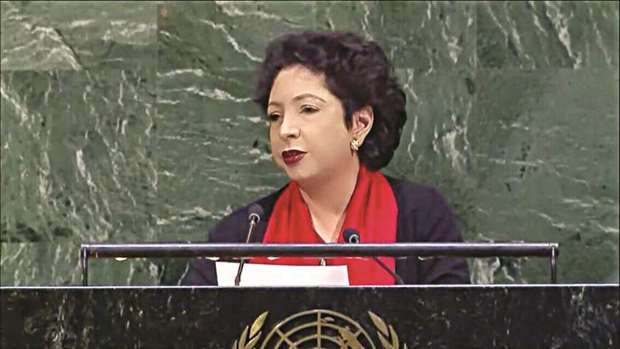Pakistan has emphasised to the United Nations that peace in Afghanistan cannot be achieved through the military means.
Speaking in the Security Council debate on Afghanistan, Pakistan’s ambassador to the UN Maleeha Lodhi said that 16 years of war waged by the world’s most powerful forces against an insurgency of irregulars had not yielded a military solution.
She told the 15-member council that neither Kabul and the international coalition, nor the Afghan Taliban can impose a military solution on the other.
The central question in Afghanistan today, she said, is “do we choose the path of war or peace?”
The Pakistani envoy pointed out that the international community is unanimous in its view, as is the UN secretary general, that sustainable peace is only achievable through a negotiated end to the war.
Pakistan, she asserted, had long proposed this as the most viable course to end decades of conflict and suffering in Afghanistan.
Lodhi stressed that the search for peace through negotiations must be the priority objective of the Afghan government, for the Taliban, for Afghanistan’s neighbours, and for the United Nations.
In her statement to the Security Council, the Pakistani ambassador warned of a new and vicious threat that has emerged in Afghanistan with the presence of a conglomerate of terrorists from various parts of the world, including the TTP (Tehrik-i-Taliban Pakistan, the Pakistani Taliban), the ETIM (the Eastern Turkistan Islamic Movement, a separatist group in China’s Xinjiang province), and the IMU (the Islamic Movement of Uzbekistan).
These have now all come under the umbrella of the Islamic State (IS) group (known as Daesh in Arabic).
“It appears that Daesh’s ‘core’, under pressure in Iraq and Syria, may be relocating to these ungoverned spaces in Afghanistan,” Lodhi added.
Expressing deep concern over IS’s presence in the Afghan provinces bordering Pakistan, Iran, and Central Asia, she said that this posed a threat not only to Afghanistan, but also to its neighbours.
“It is the responsibility of the Afghan government and the international coalition to root out Daesh and associated terrorists from Afghan territory and prevent them from launching attacks against Afghanistan’s neighbours,” she said.
Lodhi also told the council about the “Afghanistan-Pakistan Action Plan for Solidarity”, proposed by Pakistan last month to strengthen relations with Afghanistan in all spheres political, economic, defence, education, and culture.
Highlighting the need to secure the Pak-Afghan border and prevent cross-border terrorism, she said this could be achieved only through constant vigilance, effective management, and real-time communication.
“Terrorists should not be allowed to provoke clashes between our border security forces,” Lodhi remarked.
Voicing concern over the alarming rise in drug cultivation, the Pakistani ambassador to the UN called upon the Afghan government and the international coalition to “energetically” eradicate drug production and its links with terrorism.
The peoples of Pakistan and Afghanistan, she said, are bound by the unbreakable ties of history, faith, blood and language, as well as mutual interdependence.
“When the people of Afghanistan needed refuge, the Pakistani people opened their homes and their hearts to them. Close to 3mn Afghans still reside in Pakistan,” she added.

Lodhi: When the people of Afghanistan needed refuge, the Pakistani people opened their homes and their hearts to them. Close to 3mn Afghans still reside in Pakistan.
